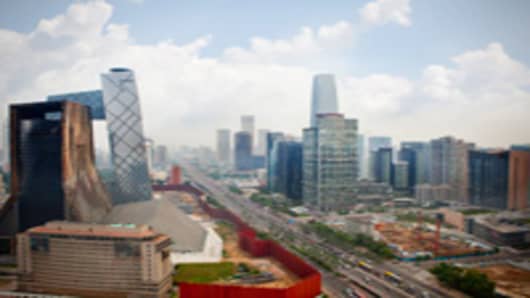Continued weakness in China’s economic data, as well as growing risks of a Greek exit from the euro zone, will drive Beijing to launch aggressive stimulus measures in order to prevent a further deterioration of growth in the world’s second largest economy, economists and strategists tell CNBC.
On Thursday, the HSBC Flash Purchasing Managers Index(PMI), the earliest indicator of China's industrial activity, fell to 48.7 in May from a final reading of 49.3 in April. It marked the seventh straight month that the HSBC PMI has been below 50, indicating contraction.
“All signs point to the fact that the slowdown is not letting up as fast as authorities had expected, partly because of challenging external conditions and partly because of the fact their tightening last year was too effective,” Donna Kwok, HSBC, Greater China economist, told CNBC Asia’s “Cash Flow.”
“We are going to have to see more active support being directed directly to consumer and business rather than through the monetary system via the banks,” Kwok added.
China, which began to tighten its monetary policy in late 2009 to stem rising inflation , is now facing a sharp slowdown in the economic activity, raising fears of a hard landing for the economy.
In a sign the government is already growing worried about the slowdown, a state-backed newspaper reported on Tuesday that China will fast-track approvals for infrastructure investment.
Dariusz Kowalczyk,senior economist and strategist, Asia ex-Japan, at Credit Agricole, said the weak HSBC Flash PMI data strengthen the case for easing and he expects more fiscal stimulus.
“The focus of the stimulus is likely to be on the fiscal side, probably as a ‘mini-Lehman crisis’ package of state-directed lending for investments in infrastructure, because this is the fastest way to boost aggregate demand,” he said in a note to clients.
While Kowalczyk believes monetary policy is unlikely to be used as aggressively, he expects a push towards quantitative easing through “pressuring” banks to lend more via further reductions in the reserve requirement ratio (RRR).
China has cut the RRR three times since November 2011, with the last move on May 18, and Kowalczyk expects up to 150 basis points in RRR cuts and 50 basis points in interest-rate cuts this year.
‘Grexit’ Scenario
In addition to a deterioration of domestic economic indicators, headwinds from Europe’s debt crisis, particularly risks surrounding a Greek exit from the euro zone, are growing a concern and could trigger “massive” stimulus measures, said Peng Wensheng, chief economist at state-owned investment bank China International Capital Corp.
According to Wensheng, if Greece were to leave the currency bloc, China would need a 600 billion yuan ($94.7 billion) stimulus package to shield the economy from any fallout by the exit and meet its 7.5 percent growth target.
A Greek exit, which would hurt China’s exports and result in large capital outflows, could drag economic growth in the mainland down to 6.4 percent in 2012, he said.
“Assuming a Greek euro exit drags down global economic growth by half as much as the 2008-2009 global financial crisis did, China’s economic growth would fall to 6.4 percent in 2012, 1.7 percentage points lower than our baseline forecast of 8.1 percent,” he said in a research note.
Undershooting Growth Target
Sean Darby, Hong Kong-based chief global equity strategist atbrokerage Jefferies, said that according to many ‘on-the-ground’ measures of economic growth, gross domestic product in China is running at 5 percent, which is much below the government’s 7.5 percent target.
“A number of them such as inventory growth, working capital loans, and letters of credit issued in Taiwan (a major trading partner) are on a similar trajectory experienced through the first half of 2008,” Darby said.
A large reason for this is that recent tightening measures have lessened the availability of working capital — an important component for the country’s manufacturing sector, which accounts for more than one-third of China’s GDP, he said.
“Working capital is the lifeblood of developing economies, since it is the oil that lubricates the flow of money internally,” Darby said. “If it gets ‘stuck’ or glued, economic growth can slip far below trend.”
“Chinese authorities are clearly behind the curve if they wish to support their economic growth anywhere close to the desired 8 to 7.5 percent target. It is working capital that needs to grow in the economy,” he said.
—By CNBC Asia’s Ansuya Harjani



